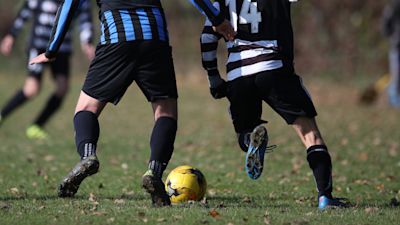Ex-England goalkeeper David James warns children are being priced out of grassroots football

Video report by ITV News Anglia's Andy Ward
Grassroots football clubs are facing an existential crisis as they juggle rising costs with the need not to price already cash-strapped families out of the game.
From flood lights to petrol, clubs have seen prices sky rocketing and warn they are having to make tough decisions to stay afloat.
It comes as a report, spearheaded by former England goalkeeper David James, found a third of parents feared they would not be able to afford kit next season while around 40% were struggling to afford subs.
The former England and Liverpool number one warned the mental and physical health of children was at risk if access to grassroots sport became too difficult.
Watch an extended interview with David James
"It's fundamentally important for so many children, so many families, to allow their kids to go out and play football and that's being restricted at the moment," he said.
"If we don't do it today, it's going to be a legacy that NHS is going to have to deal with in the future."
The Price to Play Report said 2,600 grassroots football clubs had already folded following the pandemic and a further 6,000 were at risk of closure between now and the end of next season.
Some 10% of players have not returned to the pitch since Covid hit with more than 50% of parents saying costs had got in the way of play.
Lowestoft Town Football Club in Suffolk, like many others, is feeling the pinch. Even before the recent energy price increases, it would cost £100 just to switch on the flood lights.
The cost of travelling to games rises by the week and even keeping the changing rooms clean and the bar stocked is taking its toll.
Despite all that, the board recently made the decision to reduce gate prices for spectators.
But with families facing more and more pressure on their budgets, the club knows it still needs to give parents a good reason to step through the turnstiles.
"When you look at 12 months' time, you hope you have managed to produce enough excitement, enough entertainment, that people will still see it as value," said Andy Reynolds, academy manager and first team assistant manager.
"[Families] will have to pay their bills, their rent, before they start to do the hobbies and the kids' clubs. As long as we can remain part of their priorities in the community, we will survive."
Jo Woolnough is one of those mums having to decide what her priorities are.
Her energy bills have risen from £100 to £270. With another price rise to come in the autumn, the mum of two boys had to ask her sons to choose which clubs they wanted to cut as the family streamlined its budget.
Luckily for Lowestoft Town, nine-year-old Dougie chose to keep football.
"It's probably my favourite thing to do," he said. "It makes me feel happy when I'm sad, makes me feel more confident in what I do. I've made friends for life now."
Dougie used to do martial arts twice a week and was working towards his black belt - but at £48 a month, his parents could no longer justify it.
"People are going to foodbanks," said Mrs Woonough. "Clubs are the last of their priorities.
"We're quite lucky. But you don't know what's round the corner. The monthly outgoings and cost of everything has gone through the roof."
Goalkeeper James said he was already involved in a scheme called Football Rebooted, which aims to redistribute football boots once children have outgrown them.
He said the campaign was now hoping to convince government to increase the Pupil Premium - a payment schools receive to offer extra support to children from disadvantaged families - to allow some of that money to be used to improve access to sport.